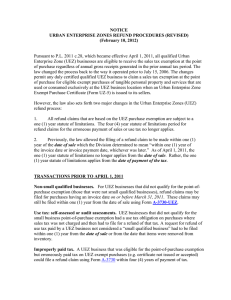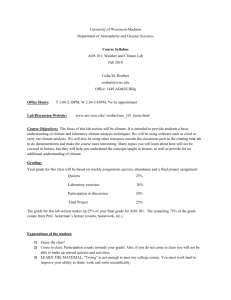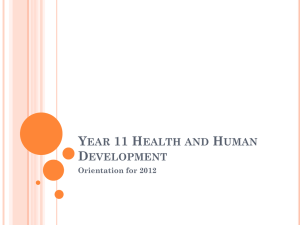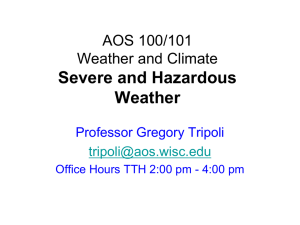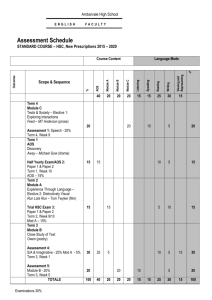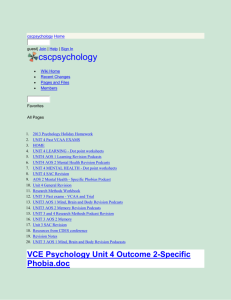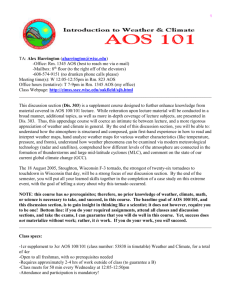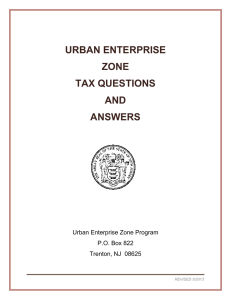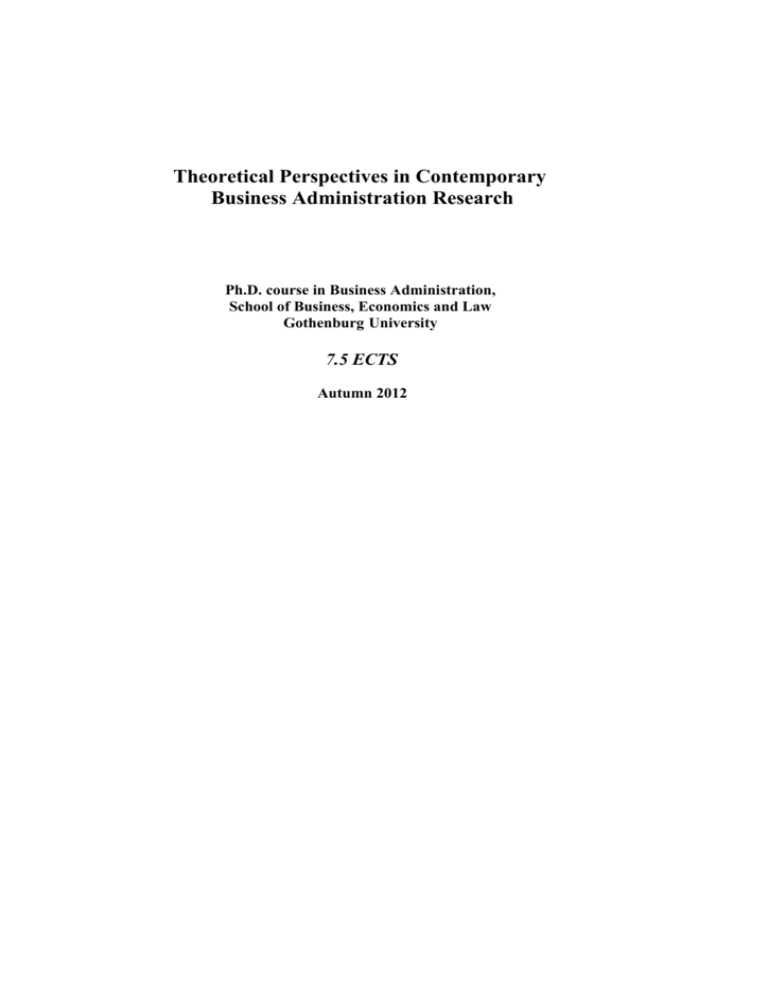
Theoretical Perspectives in Contemporary
Business Administration Research
Ph.D. course in Business Administration,
School of Business, Economics and Law
Gothenburg University
7.5 ECTS
Autumn 2012
Course objectives
The aim of this course is to provide PhD-students a general knowledge about common
theoretical approaches, which have prominent positions within contemporary business
administration research. All students should reflect upon the usefulness of these theoretical
approaches with regards to own research work.
Course content
The course will cover a wide range of theoretical perspectives, which can be seen in the
overview of the literature and the required reading listed below. This course provides a starting
point for post-graduate studies in Business Administration, offering a deep reflection on
theoretical perspectives, which have prominent positions within contemporary business
administration research.
The course consists of two parts. The first part consists of seminars, led by a scholar with great
experience of the approach. The students are supposed to read all the literature related to the
seminar and to write a short report (1-2 pages) that reflects upon the related literature. The short
report should include a couple of questions that the students want to address to the lecturer.
The second part is a seminar based on a presentation and a discussion of term-papers. The termpaper should include at least two of the theoretical approaches and it should be related to the
students own PhD-project. The writer is supposed to present his/her paper and it should be
discussed by two other students.
Examination
All students are supposed to attend and to be active at all seminars, and to write the short reports
and the term-papers. The students may have to rewrite reports and term-papers in order to pass
the course. Absenteeism and passivity will lead to extra assignments.
Responsible for the course: Ulla Eriksson Zetterquist – uez@gri.gu.se
Course coordinator: Peter Beusch – peter.beusch@handels.gu.se
Participating lecturer: Andreas Diedrich – andreas.diedrich@gri.gu.se
Course secretary: Petri Ruotsalainen-petri.ruotsalainen@handels.gu.se (you need to register to him)
2
Schedule
Date
Time/Room Theme
Teacher
Sept 4
13-15, C35
Introduction
PB and UEZ
Sept 6
13-16, C35
Marketing and STS
Frank Cochoy
Sept 13
13-16, C35
Critical theory
Mats Alvesson
Oct 2
13-16, C35
Operations Mgm &
Supply Chain Network Theory
Anna Nagurney
Oct 4
13-16, C35
Human Capital Theory
Yitzhak Haberfeld
Oct 9
13-15, B34
MAMCA / Socio-Economic Theory
Cathy Macharis
Oct 9
15-17, B34
Mid-term reflections/instructions turn-papers.
AD and UEZ
Oct 11
12-15, B34
Contingency theory
Jan Greve
Oct 18
9-12, C35
Organizational culture
Gideon Kunda
Oct 25
13-16, C35
Institutional approaches in management
& organization studies
UEZ
Presentation of papers
PB, UEZ and Andreas Diedrich
Nov 23
8-17, GRI
Seminars and Literature:
Literature is to be read and reported 48 hours before the seminar via E-mail to
peter.beusch@handels.gu.se and ulla.eriksson-zetterquist@gri.gu.se. No reporting is needed in
advance of the first meeting (introduction), however, please read the literature.
1. Introduction
Morgan, G. (1980). Paradigms, metaphors, and puzzle solving in organization theory.
Administration Science Quarterly, Vol. 24, No. 4, pp. 605-622
Llewelyn, S. (2003). What counts as “theory” in qualitative management and accounting research?
Introducing five levels of theorizing. Accounting, Auditing & Accountability Journal, Vol. 16,
Nr. 4, pp. 662-708
Weick, K. E. (1995). What theory is not, theorizing is. Administrative Science Quarterly, Vol. 40,
pp. 385-390
2. Performativity and ”market-things” (Franck Cochoy)
Cochoy, F. (1998), “Another Discipline for the Market Economy: Marketing as a Performative
Knowledge and Know-how for Capitalism,” in Callon, Michel (ed.), The Laws of the Markets,
Sociological Review Monographs Series, Oxford, Blackwell, pp. 194-221.
3
Cochoy, F. “‘Market-things Inside’ : insights from Progressive Grocer (United States, 19291959)”, in Cayla, Julien and Zwick, Detlev (eds.), Inside Marketing, Oxford, Oxford University
Press, 2010, pp.
58-84.
3. Critical theory (Mats Alvesson)
Alvesson, Mats (2008) The future of critical management studies. In Barry, J. (ed) The Sage
Handbook of new approaches to organization studies. London: Sage. Pp 11-30.
Alvesson, Mats & Spicer, Andrew (2012) Critical leadership studies: the case for critical
performativity. Human Relations. 65/3: 367-390.
Alvesson, Mats & Spicer, Andrew (2012) A stupidity-based theory of organizations. Journal of
Management Studies. Doi: 10.1111/j.1467-6486.2012.01072.x
4. Operations Management and Supply Chain Network Theory (Anna Nagurney)
J. G. Wacker (1998) "A Definition of Theory: Research Guidelines for Different TheoryBuilding Research Methods in Operations Management," Journal of Operations Management,
16, pp 361-385.
I. J. Chen and A. Paulraj (2004) "Towards a Theory of Supply Chain Management: The
Constructs and Measurements," Journal of Operations Management, 22, pp 119-150.
A. Nagurney and Q. Qiang (2012) "Fragile Networks: Identifying Vulnerabilities and Synergies
in an Uncertain Age," International Transactions in Operational Research, 19, pp 123-160.
A. Nagurney and M. Yu (2012) "Sustainable Fashion Supply Chain Management Under
Oligopolistic Competition and Brand Differentiation," International Journal of Production
Economics, 135, Special Issue on Green Manufacturing and Distribution in the Fashion and
Apparel Industries, pp 532-540.
A. Nagurney (2012) "Supply Chains and Transportation Networks," in the Handbook of
Regional Science, M. M. Fischer and P. Nijkamp, Editors, Springer, Berlin, Germany, in press.
5. Micro-economical perspective/ Human capital theory (Yitzhak Haberfeld)
Becker, Gary S. (1993). HUMAN CAPITAL (3rd edition). Chicago: The University of Chicago Press,
Chap. III (pp. 29-58).
Ehrenberg, Ronald G. and Smith, Robert S. (2006). MODERN LABOR ECONOMICS (9th edition).
Boston: Pearson, Addison, Wesley, Chap 9 (pp. 275-311).
4
6. Economic theories including stakeholders within transportation (Cathy Macharis)
Macharis, C.; De Witte, A. & Ampe, J. (2008). The multi-actor, multi-criteria analysis
methodology (MAMCA) for the evaluation of transport projects: Theory and practice. Journal of
Advanced Transportation, Vol. 43, No. 2. pp. 183-202
7. Mid-term reflections (UEZ, AD)
8. Contingency theory (Jan Greve)
Donaldson, L. (2001). The Contingency Theory of Organizations, Chapter 1 (pp. 1-30), Sage
Gerdin, J., & Greve, J. The appropriateness of statistical methods for testing contingency hypothesis in
management accounting research, Accounting, Organizations and Society (2007), Volume 33, Issues 7-8,
pp. 995-1009.
Gerdin, J, & Greve, J., (2004). Forms of contingency fit in management accounting research - a critical
review, Accounting, Organizations and Society, 29, pp. 303-326
9. Organizational culture (Gideon Kunda)
Ailon, G & Kunda, G (2009) The One-Company Approach': Transnationalism in an Israeli—Palestinian
Subsidiary of a Multinational Corporation. Organization Studies July 2009 vol. 30 no. 7 pp. 693-712
Kunda, G. (1992). Engineering Culture, (Chapter 1, 4 and 5). Philadelphia: Temple University Press.
10. Institutional Perspectives in Management and Organization Studies (UEZ)
Czarniawska Barbara (2009) Emerging Institutions: Pyramids or Anthills? Organization Studies
30(4): 423–441
DiMaggio, Paul J. och Powell, Walter. W. (1983/1991) The Iron Cage Revisited: Institutional
Isomorphism and Collective Rationality in Organizational Fields. Ur Powell, Walter W och
DiMaggio, Paul J. (red) The New Institutionalism in Organizational Analysis. Chicago: The
University of Chicago Press. S. 63-82.
Meyer, John W. och Rowan, Brian (1977) Institutionalized Organizations: Formal Structure as
Myth and Control. American Journal of Sociology. 83/2: 340-363.
Thornton, Patricia H. and Ocasio, William (1999) Institutional Logics and the Historical
Contingency of Power in Organizations: Executive Succession in the Higher Education
Publishing Industry, 1958‐1990. American Journal of Sociology, Vol. 105, No. 3 (November
1999), pp. 801-843
11. Presentation of papers (UEZ, AD, PB)
5


